My friend used to live in Dubai. She hated it.
“I have nothing to say. My life is boring. This place is boring,” she’d report, for years.
That is, until she moved to a different emirate in the UAE.
It was an emirate called Ras Al-Khaimah, much less touristy and less….shiny.
It was cluttered—dirty even!—and you could actually have a cultural encounter beyond a bottomless mimosa brunch. You could even maybe go buy hummus at a grocery store that wasn’t operated by iPads. You could pick up some baklava at a store with a wooden door and a star window. The skyline was cluttered with minarets and tile roofs instead of organized into rows of silver buildings in the exact same style. This place had personality.
“This is what I love about RAK,” my friend said, “There are contrasts: old and new, clean and dirty, pretty and ugly. That’s what makes a place beautiful. Its contrasts.”
When I heard it, I loved that idea….intellectually.
In practice, I struggled with it.
Ahem, *struggle with it.
Because of my particular brain inner workings, if one thing goes ‘wrong’ on a trip, it’s ruined.
If I get in an argument with someone I care about, I guess we’re no longer friends.
If I can’t provide the most magical glittering golden memory for a loved one at a restaurant or in a city or during a play of my choosing…it’s worthless.
I have a really hard time living in contrasts.
I attribute that to my mental companion, OCD. I’ve been living with OCD since my first light-switch ritual at age 4, but I was only diagnosed two years ago.
OCD manifests in all kinds of unpleasant forms, and mine is a very un-cute voice that doesn’t allow me to appreciate contrasts, because I crave order to make sense of a world that my brain really struggles to process.
OCD is often called “the doubt disease.” We obsessive-compulsive types might love the idea of leaning into mystery and uncertainty as the forces that give life its cluttery character, but there are certain topics that we have to be 100% sure about.
I ruminate and obsess until I’ve figured it all out, only to find a hole in my argument and relapse back into the terror of ambiguity.
The stereotypical image of someone with OCD is a person who is terrified of contamination, washing their hands raw because they’re never clean enough. I suppose my specialty is a fear of spiritual or emotional contamination, scared that feelings or questioning might leak over into the wrong areas where they don’t belong.
What if my partner has even a drop of fondness for his ex? What if this random intrusive thought means I actually do want to run into traffic? What if my faith isn’t real and my goodness isn’t in-tact and I can’t personally solve or even understand suffering and what if I ruined our trip because I booked the wrong reservation time?
For some people, assurance would be enough to soothe these stressors. For me, assurance will never be enough.
Intellectually, I know that, which is why I’ve tried reeeeeally hard to stop asking for reassurance, and consult one of my many mantras instead:
I can never know, and that’s okay
This thought is unpleasant, but it’s safe
I am not afraid of this thought
Thinking about it more won’t bring relief
It could be true or not true
I’m having a hard time right now, but it will pass
When I’m saying one of these mantras to myself, “stress” is an understatement. What I’m experiencing during a trigger feels life-threatening, like a bear is roaring right in front of me or there’s a gash on my arm, and people around me are saying “Don’t worry” or “Don’t feel pain.”
Thought substitutions are pointless for a brain like mine. My genius friend Dr. Hillary McBride wrote, “Thoughts are like blossoms on a flower—there's a stem and then a whole root system beneath them. Thought substitution alone is like plucking off a dandelion bloom, glue-gunning a daffodil blossom on the stem, and expecting daffodils to keep blooming.”
For so long I tried to ration my way out of painful thoughts, as though I could somehow think my way out of a broken arm.
Meanwhile, whenever surprised by one of my triggers, I’d curl up like something tangible was trying to physically hurt me; it literally felt like a predator threat. Loved ones in my midst have walked away or put on noise-canceling headphones when I was in the midst of a panic attack.
I realize it’s easy to diminish these thoughts when you don’t have them, but I can’t begin to tell you how scary that was: to be alone while being ambushed by my own brain.
Fortunately, I haven’t felt that way in a long time. Medication soothed the edges and turned the volume down on my spikiest stressors, and now begins the journey of caring for a milder chronic illness.
In the past, I haven’t shared my specific medication because every body is so different and I don’t want anyone to look to me instead of their doctor. But at this point I’ve tried many, and just in case SSRIs and other options (there are many!) haven’t worked for others, I’m happy to share what’s worked for me:
I’m on 225mg of Effexor daily, and it’s completely changed my entire experience of living on earth. 225mg is far past the FDA-approved limit for an SNRI, but people with OCD need the highest dosage and then some. (I don’t make the rules!) I also have Xanax and Propranolol on hand for when I’m triggered to the point of panic.
I started taking Effexor when Zoloft wasn’t kicking in, and I started taking Zoloft when I started dating Mr. Mari and he got really worried about my panic attacks.
There was a moment (on Valentine’s Day, naturally) where I had a massive panic attack and Mr. Mari gently walked over to me with his trademark concern and care and reassuring shoulder rubs. But I knew that, this time, his concern and care and shoulder rubs had an ‘ask’ attached.
“I know you’re struggling. You’re really suffering, I know you are. I can tell you’re in so much pain. And I really, really need you to think about this,” he said, continuing to rub my shoulders but staring at me like he really meant business.
This meant medication, which scared me a lot. I winced.
I didn’t want to admit that I needed it. I didn’t want to be “on something” forever. I didn’t want to see a psychiatrist on top of a psychologist. And mostly, I didn’t want any side effects (like gaining weight, which I did, and lived to tell the tale!).
But part of commitment to another person, I realized, was commitment to my own health and well-being. Medication was the only thing that fully adjusted my brain to a setting I didn’t know existed: Easeful. Manageable. Two years later, I’m managing, though the desperation for certainty and the fear of intrusive thoughts will always linger in the background like little gremlins poking out their heads.
So let’s get back to the UAE and contrasts:
I still have a very hard time coping when something goes “wrong.” A change in routine, a shift in plans, an unexpected delay or a surprise will flip-turn-upside-down my equilibrium. I’m probably not alone in this.
Anything out of the ordinary, out of my routine, and out of my expectations may crush me. If I start having a bad day, we’re not coming back from that easily!
But I’ve learned to keep the “visual mantra” of Ras Al-Khaimah as opposed to Dubai. The image of the two has helped me more than the phrases I used to repeat above.
In Dubai, everything is perfect and glistening. All the buildings are designed with smudge-free glass and right angles. Nothing is out of line; the cityscape tells a story of slick uniformity and obedience to the rule of design.
A common reaction to the skyline is that it looks fake; it’s too perfect.
My friend quickly got depressed living there; it was excess and dazzle, too little friction and grit.
But as soon as she moved to RAK, she enjoyed being repelled by ugliness because it actually said something about her soul. She welcomed the crumbling stone, she craved the graffiti, she was elated to find a hand-painted sign and an uneven sidewalk.
My wedding was not perfect. My honeymoon was not perfect. My much-anticipated trip to the organic market in Mexico yesterday was not perfect. It is so hard for me to process and admit this.
But all these events were celebrations of contrasts: the new, old, modern, plain, weird, experimental, flawed, natural, man-made, spoiled, and spotless. My friend in the UAE reminded me how joy-giving this mess can be.
Now, instead of concluding that one flaw “ruined” the entire experience, I’m adding it to the entire experience: Here’s something gorgeous, here’s something difficult, here we are happy, here we are sick, here we are being happy even though we’re sick.
Being in small-city Mexico is an intensive course in embracing contrasts and uncertainty. When I turn on the faucet, sometimes the water is clear. Sometimes it is brown. I’ve gotten used to the surprise.
And on my long walk to the city center, I pass crumbling abandoned church facades and pristine magenta mansions alike. Most of my path is made of uneven cobblestones, but there are a couple stretches of smooth pavement—something I’ve heretofore never actively appreciated.
When I begin the day not knowing what color of water is going to come out of the faucet, I can’t get too hung up on other things. It’s a daily reminder to value what I have exactly right now, and to stop grasping onto an idea of certainty that has never existed in the history of the world.
And when I walk past the crumbles and the construction of a gentrifying area in Guanajuato, I am reminded to say “and,” and “and,” and “and.” This is here, and this, and that, and Mr. Mari had other girlfriends one time, and he loves me, and I can make a fool of myself in Spanish, and I still speak Spanish, and the world is ugly, and the world is gorgeous.
My brain will always, always beg for perfection, completion, and certainty from me. That’s not going away. My psychiatrist compares my medication to insulin for people with diabetes, or glasses for people who don’t see well (me, pre-Lasik!). Medication is help but not a solution to a brain that was born wonky.
I need my support because I have a disease. I’ll have good days and bad days. I will always live with this, but there are moments when I’ll feel free to appreciate contrasts and see the lows as additions rather than contaminations. To paraphrase a Buddhist thought, “The telephone poles don’t ruin the scenery; they are part of the scenery.”
I am learning to let my brain look like Ras Al-Khaimah or this gloriously jumbled Mexican neighborhood that I adore for its surprises and asymmetry.
I have fired the original architect of my brain who designed a flawless Dubai-like shiny row of uniform buildings, and I’m inviting in some playful muralists who are going to beautify my mind’s tangled mess, ever surprising and asymmetrical.
My uncertain tangled mess theme song:
Because OCD is so misunderstood, I feel called to share info about it at the risk of repeating myself. A few lesser-known symptoms are:
-obsessing over a specific fear, like “Am I actually a good person?”
-fixating on intrusive thoughts that don’t reflect your values
-ruminating over a doubt or question because you feel like you alone can solve it
-creating specific routines or rituals to make a setting “just right”
There are therapists and medication for this particular genre of suffering. It doesn’t have to be so hard. ❤️
COMING UP!!!
I’m coming to you LIVE! Meet me in NYC, North Carolina, or Wyoming? :)
ART SHOW, MARCH 7, NEW YORK CITY
Come one, come all!!! I am having my first (!) NYC art show at a wonderful community art gallery, which will be up for all of March and April—you can see it any time. But you’re invited to the free opening party, which will be on Thursday, March 7th at 6:30-8:30pm. Mark your calendars and come say hello!
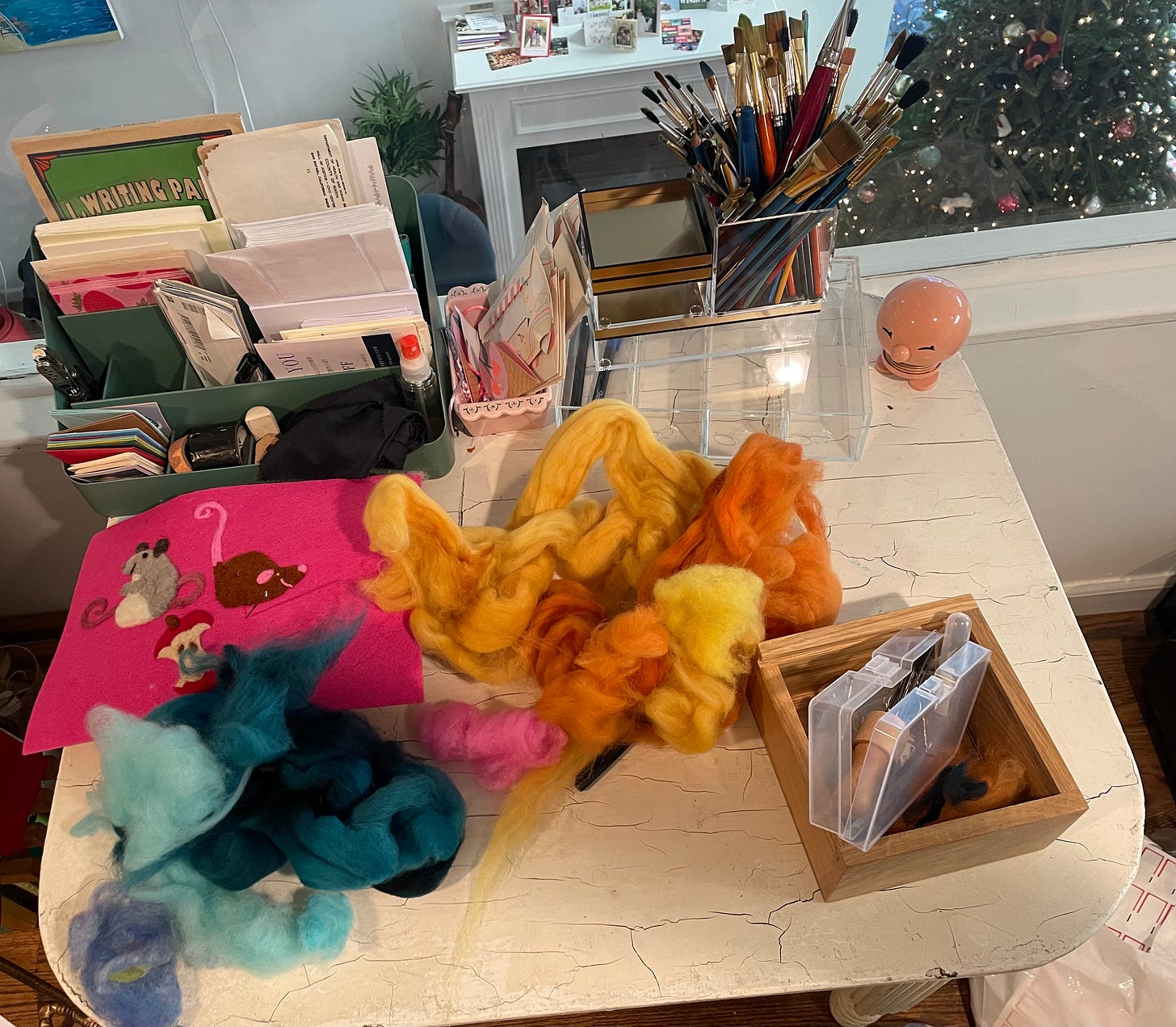
RETREAT, MAY 17-19, NORTH CAROLINA
I am thrilled to return to the Art of Living Retreat Center for another special soulful weekend of writing and art-making, this time around the theme of Your Sacred Story: Transform Your Life Experiences Into Writing & Art. This is for anyone who’s ever been told, “You should write a book!” (or anyone who’s told themself that ;) but doesn’t know where to begin, or just needs extra guidance with the art of memoir. You can either draw or write your way through this retreat, or both! ALL levels welcome, invited, supported, and appreciated. MORE INFO AND REGISTRATION HERE!
RETREAT, JUNE 16-21, WYOMING
I can’t even believe this is my life, but I get to lead a week-long retreat in northern Wyoming where we’ll stay in luxury glamping tents, eat beautiful local food prepared by a local chef, ride horses out to canyons with CAVE DRAWINGS IN THEM, and, oh yeah, write and make art!!
The theme is Writing Inner and Outer Landscapes (or you can draw, if you prefer!) so we’ll be focusing on the concept of PLACE, so we’ll…
-looking for a sense of place in our creativity, around feelings of belonging, displacement, otherness, and longing
-write or draw significant settings from memory
-hone the art of noticing and appreciating what's surrounding us
-explore themes of home, language, culture, and identity
-use sacred surroundings as an entry point to creative work
MORE INFO AND REGISTRATION HERE!

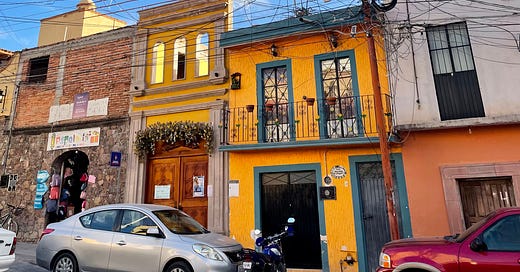



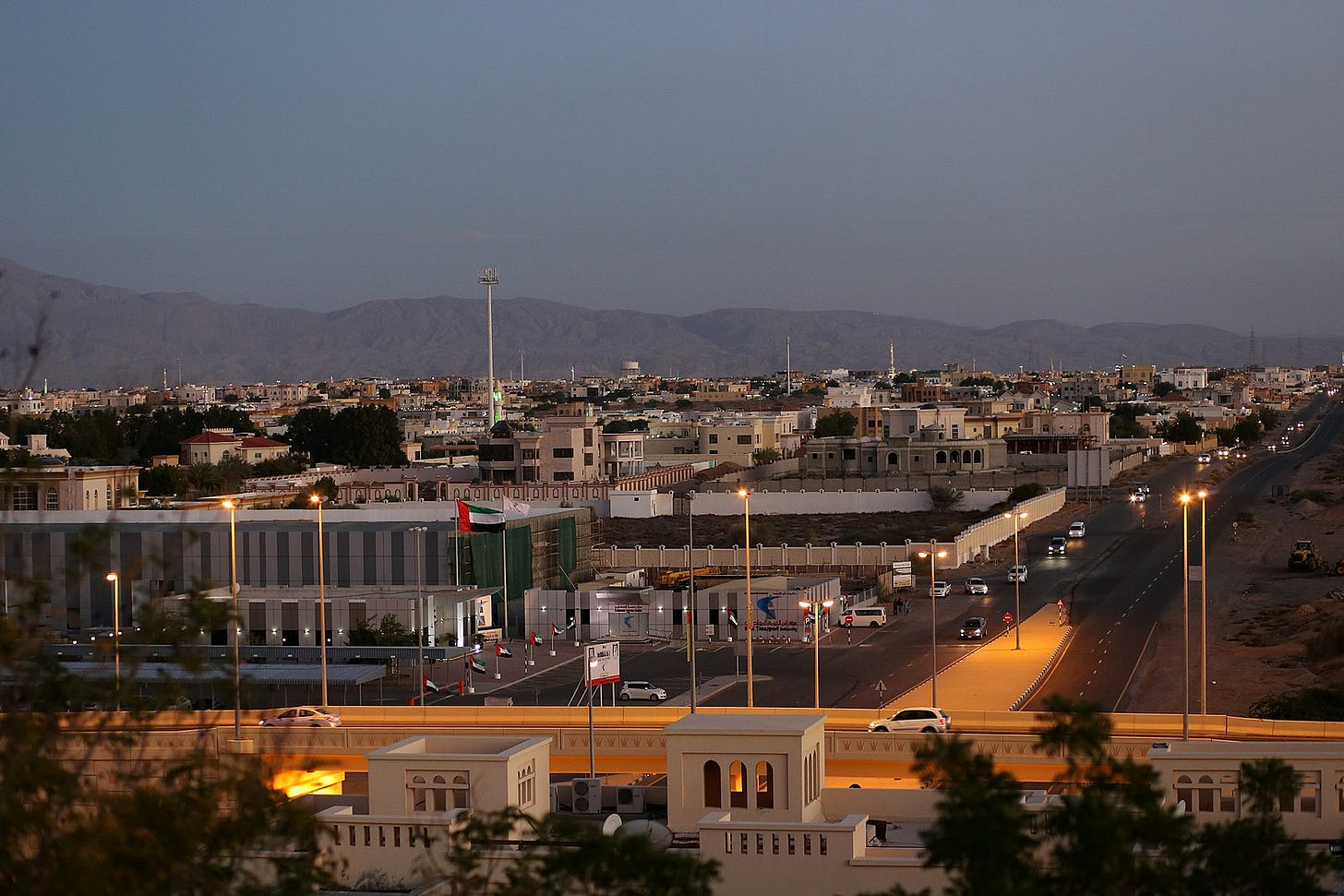


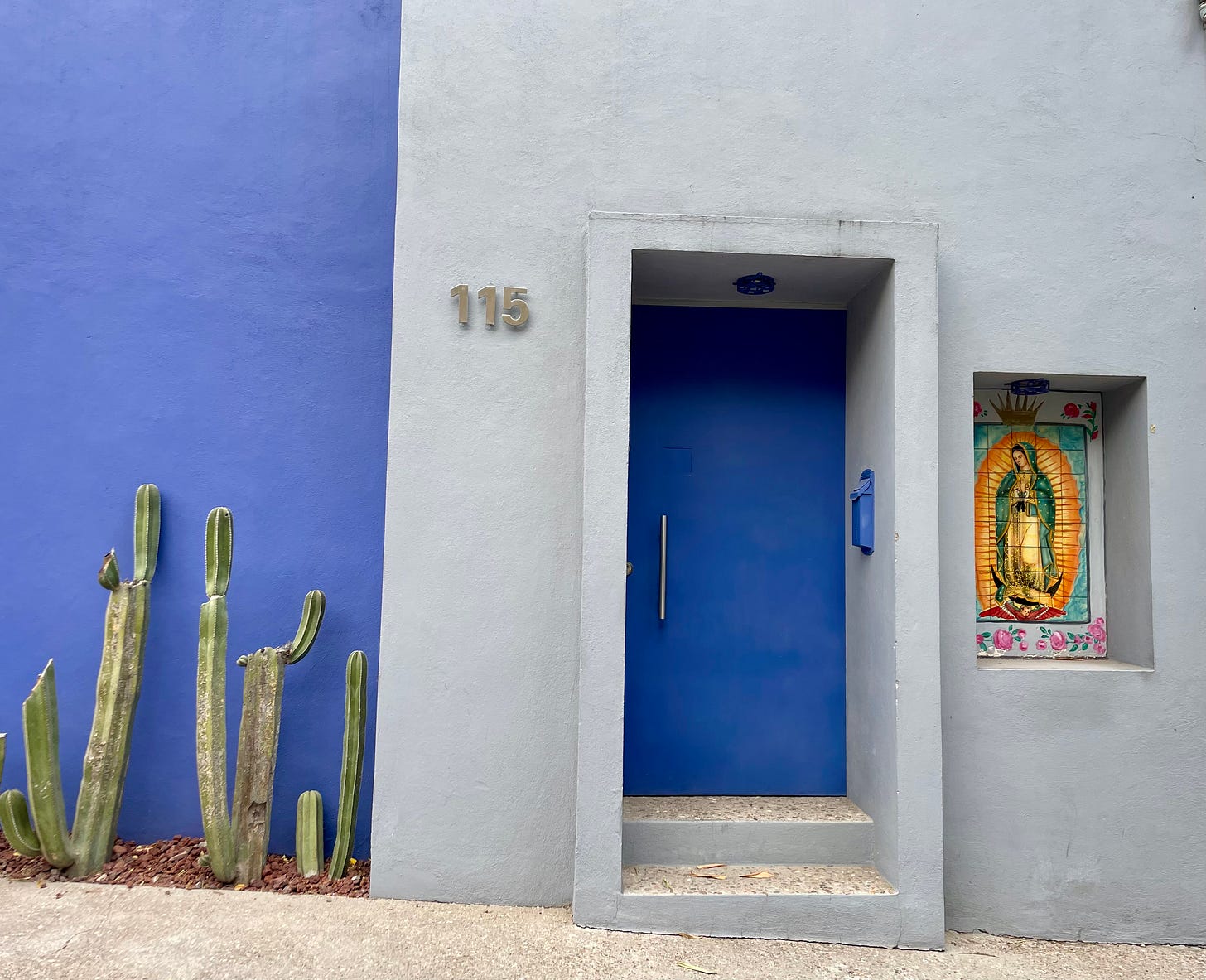
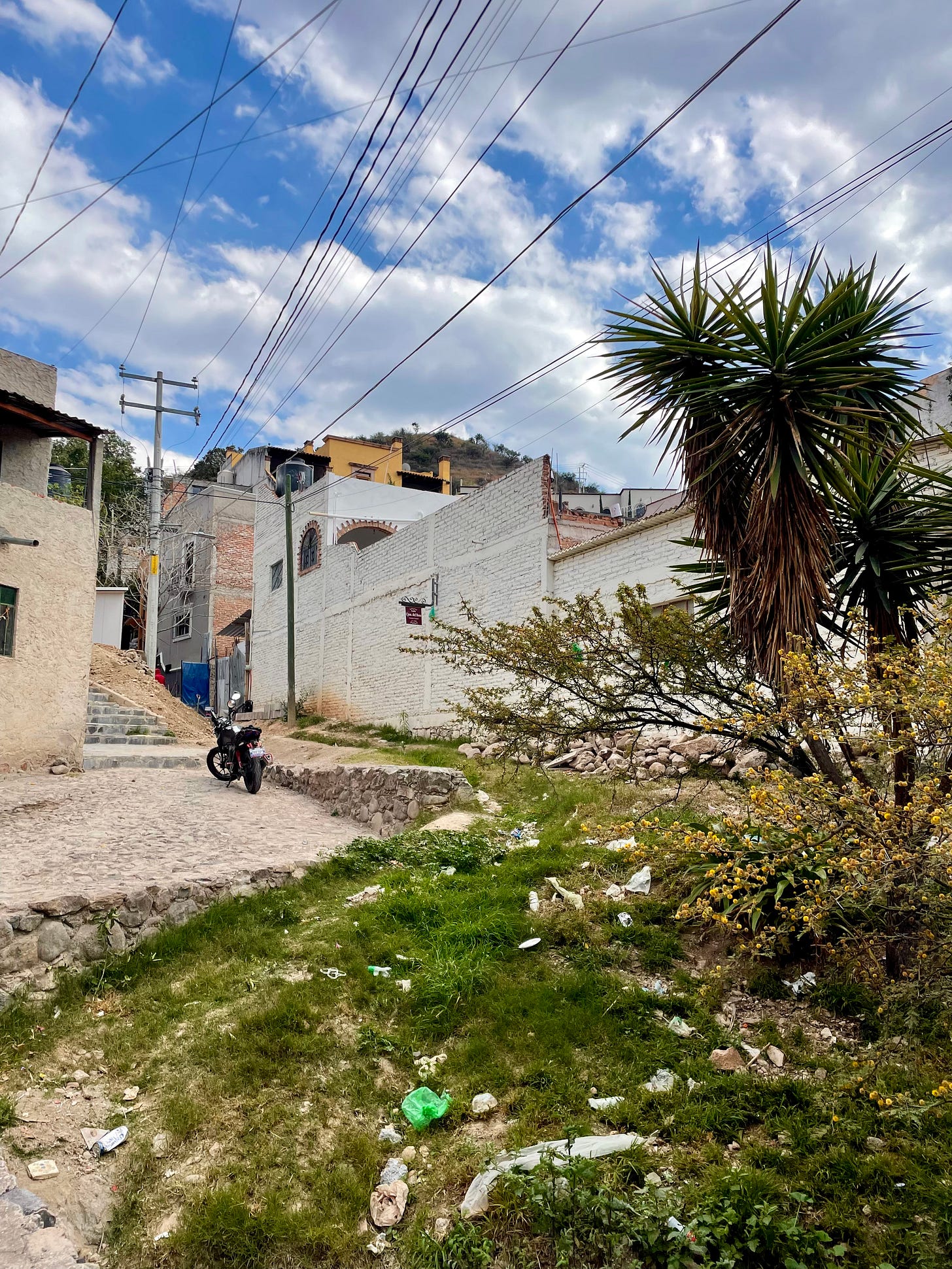


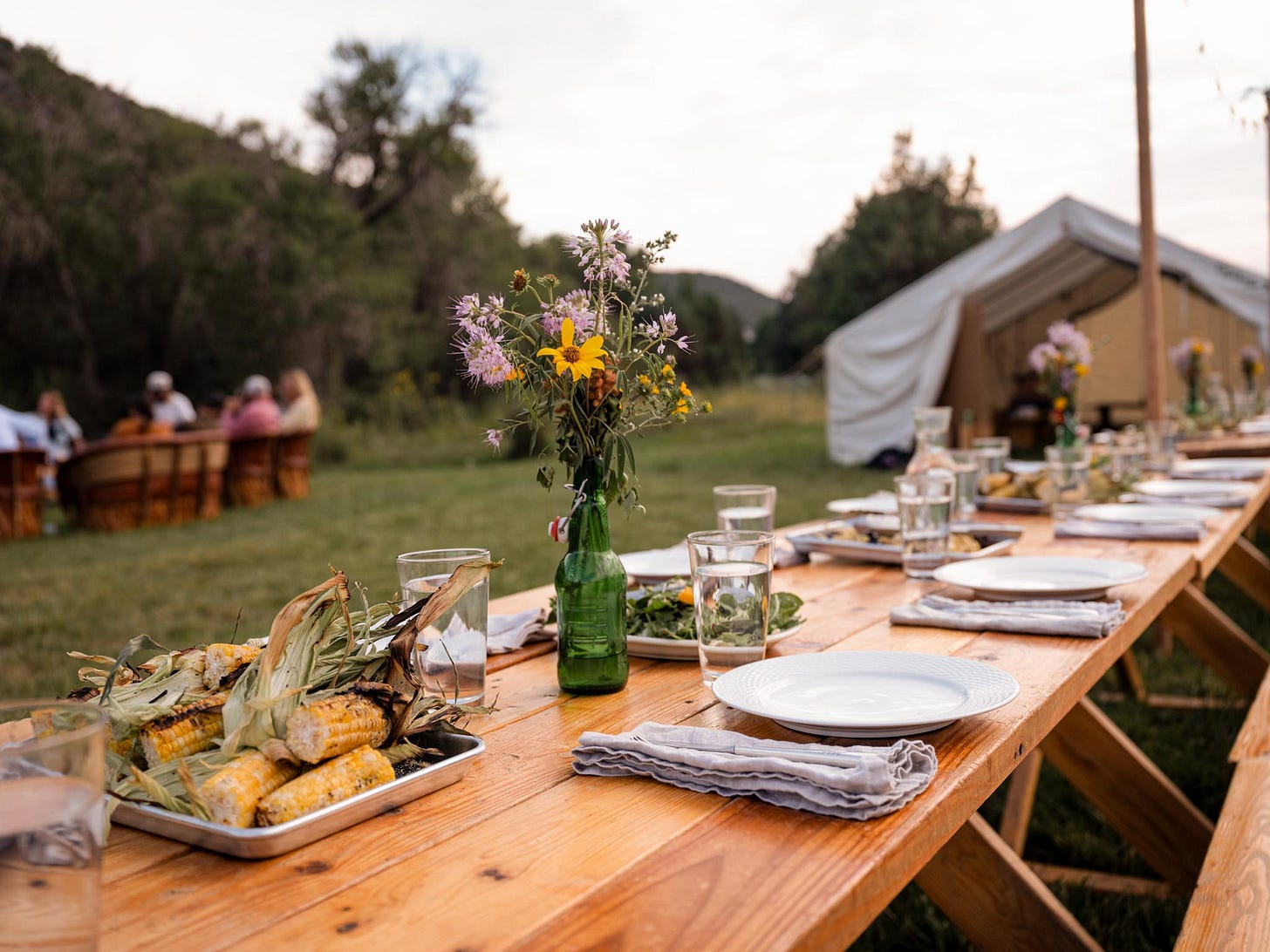
I have a heart filled with love after reading this wonderful post. Thank you for articulating some of the beauty and fear that comes with the messiness of being human and living on Earth. You've helped bring some understanding and a sense of connection.
Thank your for this generous and thoughtful essay. I love your prompts and reframes.
It reminded me that it’s been useful for me to think of my emotions as built-in protectors.
The “Compulsive” part of “OCD” has an interesting history of meanings. It came into English in the 15th c. from French and meant "application of force (to someone) to overwhelm his/her preferences."
The psychological sense entered English in 1909 as “compulsion neurosis,,” a translation of Freud’s term “Zwangsneurose.” Zwang comes from an ancient German word meaning “coercion, constraint, band, clamp, strap.”
So this history give us a bit of ancient wisdom that Compulsion and Zwang are protective. They are like a protector or guardian that holds a child’s hand, or a spotter in gymnastics, or are like safety belts.
But sometimes we don’t need our compulsions. We can always assess things and decide whether we need protection.
If we have a pattern where our Life Force is a little too vigilant, we can thank it for its attentiveness, ask it to take a step into the background, and proceed with our own preferences, which may or may not be what it recommended.
The reason it’s advantageous to say “thanks” to the compulsion is because then it won’t get defensive or dig in its heels.
Also, it’s courteous; it’s nice to have an ally that has our backs. It’s just that we need to remind our internal protectors who is directing the show, and if they are a true ally, bit by bit they will get the hint.
A further thought on language, e.g., “This thought is unpleasant, but it’s safe”:
That is nice quick way of saying: “This feeling is unpleasant, and I thank my internal guardians/ protectors for calling attention to what’s going on, but after checking it out, I find it’s _safe enough_ to actually proceed with what I prefer.”
I find “safe enough” or “safer” are more truthful and useful for me than “safe.”
Thank you for sharing your journey and for the opportunity to reflect on my own.